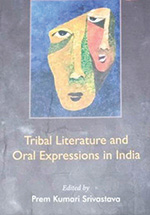The edited volume makes a significant intervention in the hitherto extant discourse on tribal/Adivasi literary studies in India. As Prem Kumari Srivastava states in her introduction, ‘this book debates and discusses tribal literatures and oral expressions that have long been surrounded by silences, even though they embrace us all the time’ (p. xiii). The contributors to the book make it a point to unfold these silences, probing the narratives of pain, deprivation and dispossession that lie therein. Srivastava highlights the theme and tenor of the book in the introduction asserting that the tribal writings symbolize a revolutionary spirit against the established culture. The collected essays take pains to highlight that we must strain further to listen to the Adivasi voices and expression. Listening to them might re-connect us with the ecological and post-humanist aspects of life, ‘While helping us to live in harmony with each other, it helps us to understand the environment as not just the outer natural world but also educational, psychological, emotional and intellectual of the inner recesses of human nature’ (p. xvi). Adivasi culture and literature alerts us to a sense of spiritual ecology, Srivastava further notes.
The book is divided into three parts: Part One titled ‘Setting Up the Perspective’ examines how oral narrative traditions have been systematically distorted by the ‘globalising determinants’ (p. 23).

